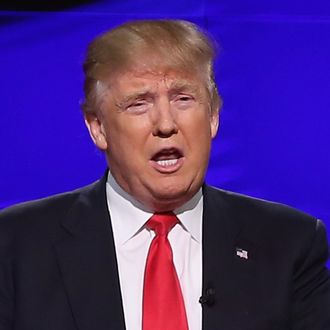
There are the substantial issues, and then there are the smaller, weirder details one finds in the current Donald J. Trump phenomenon: the hair, the self-tanner, the hands. In a piece published over the weekend in Scientific American, sociolinguist Jennifer Sclafani zeroes in on another Trumpian oddity – his idiosyncratic speech patterns.
Like countless other aspects of the Trump candidacy, people hold divided opinions here. The same words that make him seem incoherent to some make him seem authentic and plain-spoken to others. But to Sclafani, the divide can be at least partially understood by examining Trump’s use of something linguists call “discourse markers” – little words or phrases like “well,” so,” or “you know.” Everyone uses these words, whether consciously or not; without them, “conversation sounds stilted and unnatural,” she writes.
But politicians tend to use them as a handy misdirection tool, as ThinkProgress has reported. By starting with a discourse marker when answering a question in a debate, for instance, it becomes easier for the candidate to sound like he or she is answering the question posed by the moderator when in fact he or she is doing no such thing. When you are Ted Cruz, for example, and Megyn Kelly asks you whether the voting public has rejected your particular brand of conservatism, you can say, “Well, Megyn, you know, at the end of the day for the folks at home, this is not about the insults back and forth between the candidates. … This is the people at home who are struggling through seven years of Barack Obama.”
Trump, however, has not always been so successful at this, as Sclafani explained to ThinkProgress:
For example, in the first debate, he was asked to explain why he once supported a liberal, single-payer health care system. He responded: “First of all, I’d like to just go back to one. In July of 2004, I came out strongly against the war with Iraq, because it was going to destabilize the Middle East. And I’m the only one on this stage that knew that and had the vision to say it.” Trump was trying to illustrate that he has had stances contrary to the Republican party before, and that they were correct.
That introductory phrase – “first of all” – is followed by an abrupt left turn from the question, which makes his answer sound “totally incoherent” to some, Sclafani said. On the other hand, she argues, this little linguistic oddity is also exactly what makes Trump seem authentic to others. “When Mr. Trump gives a speech, viewers notice his distinctive idiolectal use of discourse markers, which also give the impression that he is having an intimate conversation with the individual voters rather than giving a prepared speech to a mass audience,” she writes. “This off-the-cuff, unrehearsed style also gives the impression that Trump is speaking for himself and not from a speechwriter’s script.”
Alas, Sclafani focuses solely on Trump’s speaking patterns, wholly ignoring the word casserole that is his Twitter feed. Sad!

